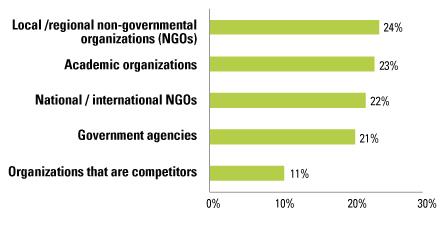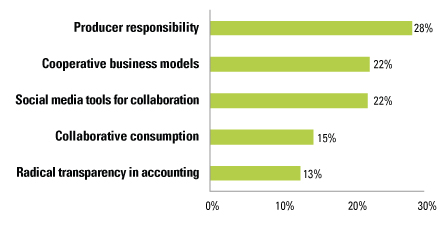Sustainability Poll Results: Organization, Collaboration and Trends
Leading Sustainable Organizations
Last month we conducted a brief poll to help us think about some of the questions we are considering for this year’s sustainability research, both the survey and interviews. The polls closed last week, and we’ve got some charts depicting reader responses below.
Question:Where did sustainability initiatives begin in your organization?

Our first question was about where sustainability initiatives originate in organizations. Historically, that’s been EH&S, and the poll bore that out, with almost twice as many people citing that as the next two most popular answers, Operations (18%) and the C-suite (16%). It could be interesting to see how that plays out. Do initiatives which begin in the organization’s C-suite have greater impact, or longevity, than those that begin in, say, operations? Do retailers tend to start in the marketing function, and then move to the supply chain? Cut with demographic data, and looked at over time, this could yield some useful info.
Question: Does your organization collaborate with any of the following around sustainability? (Select all that apply.)

We were also curious as to who organizations are partnering or collaborating with, and were (pleasantly) surprised that almost as many of you are partnering with academic organizations (23%) as with local or regional NGOs (24%). And while only 11% are collaborating with organizations that are considered competitors, that still speaks to a trend getting lots of attention recently, and one we’d like to dig in to. The benefits to these different kinds of collaboration also bear investigation.
Question: Which of the following sustainability trends or movements are you familiar with? (Select all that apply.)

Our third and final question was a reflection of our curiosity about our readers’ knowledge and awareness of various trends. There’s plenty of interest in the wider sustainability movement around things like collaborative consumption, and cooperative business models, but we weren’t sure how far those ideas have penetrated the mainstream management mindset.

Comment (1)
rodney